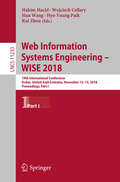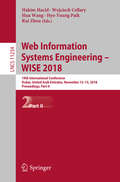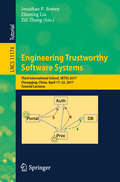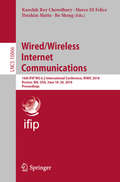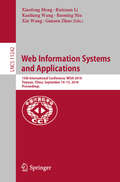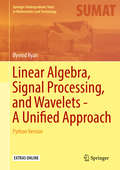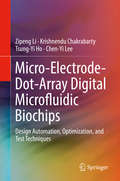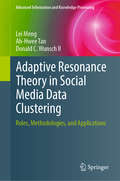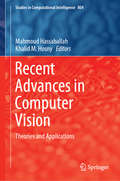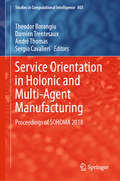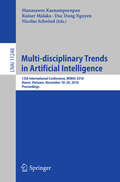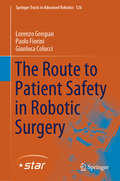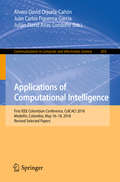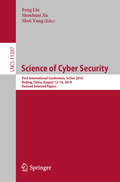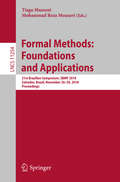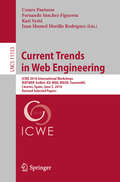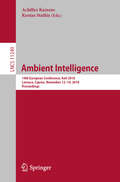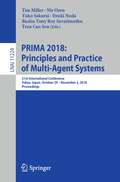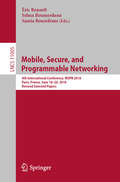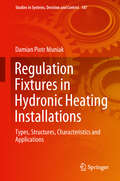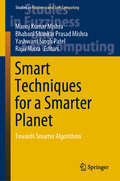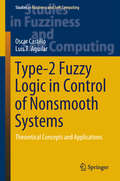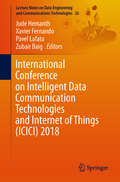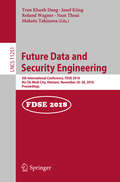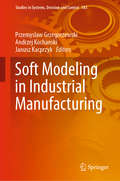- Table View
- List View
Web Information Systems Engineering – WISE 2018: 19th International Conference, Dubai, United Arab Emirates, November 12-15, 2018, Proceedings, Part I (Lecture Notes in Computer Science #11233)
by Hakim Hacid Wojciech Cellary Hua Wang Hye-Young Paik Rui ZhouThe two-volume set LNCS 11233 and LNCS 11234 constitutes the proceedings of the 19th International Conference on Web Information Systems Engineering, WISE 2018, held in Dubai, United Arab Emirates, in November 2018. The 48 full papers and 21 short papers presented were carefully reviewed and selected from 209 submissions. The papers are organized in topical sections on blockchain, security, social network and security, social network, microblog data analysis, graph data, information extraction, text mining, recommender systems, medical data analysis, Web services and cloud computing, data stream and distributed computing, data mining techniques, entity linkage and semantics, Web applications, and data mining applications.
Web Information Systems Engineering – WISE 2018: 19th International Conference, Dubai, United Arab Emirates, November 12-15, 2018, Proceedings, Part II (Lecture Notes in Computer Science #11234)
by Hakim Hacid Wojciech Cellary Hua Wang Hye-Young Paik Rui ZhouThe two-volume set LNCS 11233 and LNCS 11234 constitutes the proceedings of the 19th International Conference on Web Information Systems Engineering, WISE 2018, held in Dubai, United Arab Emirates, in November 2018. The 48 full papers and 21 short papers presented were carefully reviewed and selected from 209 submissions. The papers are organized in topical sections on blockchain, security, social network and security, social network, microblog data analysis, graph data, information extraction, text mining, recommender systems, medical data analysis, Web services and cloud computing, data stream and distributed computing, data mining techniques, entity linkage and semantics, Web applications, and data mining applications.
Engineering Trustworthy Software Systems: Third International School, SETSS 2017, Chongqing, China, April 17–22, 2017, Tutorial Lectures (Lecture Notes in Computer Science #11174)
by Jonathan P. Bowen Zhiming Liu Zili ZhangThis volume contains a record of some of the lectures and seminars delivered at the Third International School on Engineering Trustworthy Software Systems (SETSS 2017), held in April 2017 at Southwest University in Chongqing, China. The six contributions included in this volume provide an overview of leading-edge research in methods and tools for use in computer system engineering. They have been distilled from six original courses delivered at the school on topics such as: rely/guarantee thinking; Hoare-style specification and verification of object-oriented programs with JML; logic, specification, verification, and interactive proof; software model checking with Automizer; writing programs and proofs; engineering self-adaptive software-intensive systems; and with an additional contribution on the challenges for formal semantic description. The material is useful for postgraduate students, researchers, academics, and industrial engineers, who are interested in the theory and practice of methods and tools for the design and programming of trustworthy software systems.
Wired/Wireless Internet Communications: Second International Conference, Wwic 2004 Frankfurt (oder), Germany, February 2004, Proceedings (Lecture Notes in Computer Science #Vol. 2957)
by Kaushik Roy Chowdhury Marco Di Felice Ibrahim Matta Bo ShengThis book constitutes the proceedings of the 16th IFIP International Conference on Wired/Wireless Internet Communications, WWIC 2018, held in Boston, MA, USA, in June 2018. The 26 regular papers presented in this volume were carefully reviewed and selected from 42 submissions. They were organized in topical sections named: IoT and sensor networks; learning-based networking; network deployment; network security; aerial networks; and vehicular and content delivery networks.
Web Information Systems and Applications: 15th International Conference, WISA 2018, Taiyuan, China, September 14–15, 2018, Proceedings (Lecture Notes in Computer Science #11242)
by Xiaofeng Meng Ruixuan Li Kanliang Wang Baoning Niu Xin Wang Gansen ZhaoThis book constitutes the refereed proceedings of the 15th International Conference on Web Information Systems and Applications, WISA 2018, held in Taiyuan, China, in September 2018. The 29 full papers presented together with 16 short papers were carefully reviewed and selected from 103 submissions. The papers cover topics such as machine learning and data mining; cloud computing and big data; information retrieval; natural language processing; data privacy and security; knowledge graphs and social networks; query processing; and recommendations.
Linear Algebra, Signal Processing, and Wavelets - A Unified Approach: Python Version (Springer Undergraduate Texts in Mathematics and Technology)
by Øyvind RyanThis book offers a user friendly, hands-on, and systematic introduction to applied and computational harmonic analysis: to Fourier analysis, signal processing and wavelets; and to their interplay and applications. The approach is novel, and the book can be used in undergraduate courses, for example, following a first course in linear algebra, but is also suitable for use in graduate level courses. The book will benefit anyone with a basic background in linear algebra. It defines fundamental concepts in signal processing and wavelet theory, assuming only a familiarity with elementary linear algebra. No background in signal processing is needed. Additionally, the book demonstrates in detail why linear algebra is often the best way to go. Those with only a signal processing background are also introduced to the world of linear algebra, although a full course is recommended.The book comes in two versions: one based on MATLAB, and one on Python, demonstrating the feasibility and applications of both approaches. Most of the code is available interactively. The applications mainly involve sound and images. The book also includes a rich set of exercises, many of which are of a computational nature.
Micro-Electrode-Dot-Array Digital Microfluidic Biochips: Design Automation, Optimization, And Test Techniques
by Zipeng Li Krishnendu Chakrabarty Tsung-Yi Ho Chen-Yi LeeThis book provides an insightful guide to the design, testing and optimization of micro-electrode-dot-array (MEDA) digital microfluidic biochips. The authors focus on the characteristics specific for MEDA biochips, e.g., real-time sensing and advanced microfluidic operations like lamination mixing and droplet shape morphing. Readers will be enabled to enhance the automated design and use of MEDA and to develop a set of solutions to facilitate the full exploitation of design complexities that are possible with standard CMOS fabrication techniques. The book provides the first set of design automation and test techniques for MEDA biochips. The methods described in this book have been validated using fabricated MEDA biochips in the laboratory. Readers will benefit from an in-depth look at the MEDA platform and how to combine microfluidics with software, e.g., applying biomolecular protocols to software-controlled and cyberphysical microfluidic biochips.
Adaptive Resonance Theory in Social Media Data Clustering: Roles, Methodologies, and Applications (Advanced Information and Knowledge Processing)
by Lei Meng Ah-Hwee Tan Donald C. Wunsch IISocial media data contains our communication and online sharing, mirroring our daily life. This book looks at how we can use and what we can discover from such big data:Basic knowledge (data & challenges) on social media analyticsClustering as a fundamental technique for unsupervised knowledge discovery and data miningA class of neural inspired algorithms, based on adaptive resonance theory (ART), tackling challenges in big social media data clustering Step-by-step practices of developing unsupervised machine learning algorithms for real-world applications in social media domainAdaptive Resonance Theory in Social Media Data Clustering stands on the fundamental breakthrough in cognitive and neural theory, i.e. adaptive resonance theory, which simulates how a brain processes information to perform memory, learning, recognition, and prediction.It presents initiatives on the mathematical demonstration of ART’s learning mechanisms in clustering, and illustrates how to extend the base ART model to handle the complexity and characteristics of social media data and perform associative analytical tasks.Both cutting-edge research and real-world practices on machine learning and social media analytics are included in the book and if you wish to learn the answers to the following questions, this book is for you:How to process big streams of multimedia data?How to analyze social networks with heterogeneous data?How to understand a user’s interests by learning from online posts and behaviors?How to create a personalized search engine by automatically indexing and searching multimodal information resources? .
Recent Advances in Computer Vision: Theories And Applications (Studies in Computational Intelligence #804)
by Mahmoud Hassaballah Khalid M. HosnyThis book presents a collection of high-quality research by leading experts in computer vision and its applications. Each of the 16 chapters can be read independently and discusses the principles of a specific topic, reviews up-to-date techniques, presents outcomes, and highlights the challenges and future directions. As such the book explores the latest trends in fashion creative processes, facial features detection, visual odometry, transfer learning, face recognition, feature description, plankton and scene classification, video face alignment, video searching, and object segmentation. It is intended for postgraduate students, researchers, scholars and developers who are interested in computer vision and connected research disciplines, and is also suitable for senior undergraduate students who are taking advanced courses in related topics. However, it is also provides a valuable reference resource for practitioners from industry who want to keep abreast of recent developments in this dynamic, exciting and profitable research field.
Service Orientation in Holonic and Multi-Agent Manufacturing: Proceedings Of Sohoma 2017 (Studies in Computational Intelligence #762)
by Theodor Borangiu Damien Trentesaux André Thomas Sergio CavalieriThis book gathers the peer-reviewed papers presented at the 8th edition of the International Workshop “Service Orientation in Holonic and Multi-Agent Manufacturing – SOHOMA’18” held at the University of Bergamo, Italy on June 11–12, 2018. The objective of the SOHOMA annual workshops is to foster innovation in smart and sustainable manufacturing and logistics systems by promoting new concepts, methods and solutions that use service orientation of agent-based control technologies with distributed intelligence.Reflecting the theme of SOHOMA’18: “Digital transformation of manufacturing with agent-based control and service orientation of Internet-scale platforms”, the research included focuses on how the digital transformation, as advocated by the “Industry 4.0”, “Industrial Internet of Things”, “Cyber-Physical Production Systems” and “Cloud Manufacturing” frameworks, improves the efficiency, agility and sustainability of manufacturing processes, products, and services, and how it relates to the interaction between the physical and informational worlds, which is implemented in the virtualization of products, processes and resources managed as services.
Multi-disciplinary Trends in Artificial Intelligence: 12th International Conference, MIWAI 2018, Hanoi, Vietnam, November 18–20, 2018, Proceedings (Lecture Notes in Computer Science #11248)
by Manasawee Kaenampornpan Rainer Malaka Duc Dung Nguyen Nicolas SchwindThis book constitutes the refereed conference proceedings of the 12th International Conference on Multi-disciplinary Trends in Artificial Intelligence, MIWAI 2018, held in Hanoi, Vietnam, in November 2018. The 16 full papers presented together with 9 short papers were carefully reviewed and selected from 65 submissions. They are organized in the following topical sections: control, planning and scheduling, pattern recognition, knowledge mining, software applications, strategy games and others.
The Route to Patient Safety in Robotic Surgery (Springer Proceedings in Advanced Robotics #126)
by Lorenzo Grespan Paolo Fiorini Gianluca ColucciThe introduction of a new technology in a consolidated field has the potential to disrupt usual practices and create a fertile ground for errors. An example is robotic surgery that is now used in most surgical specialties, pushed by technology developers and enthusiastic surgeons. To analyze the potential impact of robotic surgery on patient safety, a consortium of major European Universities started the project SAFROS whose findings are summarized and further elaborated in the three parts of this book. Part one describes safety in complex systems such as surgery, how this may disrupt the traditional surgical workflow, how safety can be monitored, and the research questions that must be posed. Part two of the book describes the main findings of this research, by identifying the risks of robotic surgery and by describing where its ancillary technologies may fail. This part addresses features and evaluation of anatomic imaging and modeling, actions in the operating room, robot monitoring and control, operator interface, and surgical training. Part three of the book draws the conclusions and offers suggestions on how to limit the risks of medical errors. One possible approach is to use automation to monitor and execute parts of an intervention, thus suggesting that robotics and artificial intelligence will be major elements of the operating room of the future.
Applications of Computational Intelligence
by Alvaro David Orjuela-Cañón Juan Carlos Figueroa-García Julián David Arias-LondoñoThis book constitutes the thoroughly refereed proceedings of the First IEEE Colombian Conference, ColCACI 2018, held in Medellin, Colombia, in May 2018. The 17 full papers presented were carefully reviewed and selected from 60 submissions. The papers are organized in topical sections on artificial neural networks; computational intelligence; computer science.
Science of Cyber Security: First International Conference, SciSec 2018, Beijing, China, August 12-14, 2018, Revised Selected Papers (Lecture Notes in Computer Science #11287)
by Feng Liu Shouhuai Xu Moti YungThis book constitutes the proceedings of the First International Conference on Science of Cyber Security, SciSec 2018, held in Beijing, China, in August 2018.The 11 full papers and 6 short papers presented in this volume were carefully reviewed and selected from 54 submissions. The papers focus on science of security; cybersecurity dynamics; attacks and defenses; network security; security metrics and measurements; and performance enhancements.
Formal Methods: 21st Brazilian Symposium, SBMF 2018, Salvador, Brazil, November 26–30, 2018, Proceedings (Lecture Notes in Computer Science #11254)
by Tiago Massoni Mohammad Reza MousaviThis book constitutes the refereed proceedings of the 21st Brazilian Symposium on Formal Methods, SBMF 2018, which took place in Salvador, Brazil, in November 2018.The 16 regular papers presented in this book were carefully reviewed and selected from 30 submissions. The papers are organized in topical sections such as: techniques and methodologies; specification and modeling languages; theoretical foundations; verification and validation; experience reports regarding teaching formal methods; and applications.Chapter “TeSSLa: Temporal Stream-Based Specification Language” is available open access under a Creative Commons Attribution 4.0 International License via link.springer.com.
Current Trends in Web Engineering: ICWE 2018 International Workshops, MATWEP, EnWot, KD-WEB, WEOD, TourismKG, Cáceres, Spain, June 5, 2018, Revised Selected Papers (Lecture Notes in Computer Science #11153)
by Cesare Pautasso Fernando Sánchez-Figueroa Kari Systä Juan Manuel Murillo RodríguezThis book constitutes the refereed thoroughly refereed post-workshop proceedings of the 18th International Conference on Web Engineering, ICWE 2018, held in Cáceres, Spain, in June 2018. The 18 revised full papers were selected from 40 submissions. The workshops complement the main conference and explore new trends on core topics of Web engineering and provide an open discussion space combining solid theory work with practical on-the-field experience. The workshop committee accepted five workshops for publication in this volume: First International Workshop on Maturity of Web Engineering Practices (MATWEP 2018), Second International Workshop on Engineering theWeb of Things (EnWoT 2018), Fourth International Workshop on Knowledge Discovery on the Web (KDWEB 2018), International Workshop on Engineering Open Data (WEOD 2018), First International Workshop on Knowledge Graphs on Travel and Tourism (TourismKG 2018).
Ambient Intelligence: 14th European Conference, AmI 2018, Larnaca, Cyprus, November 12-14, 2018, Proceedings (Lecture Notes in Computer Science #11249)
by Achilles Kameas Kostas StathisThis book constitutes the refereed proceedings of the 14th European Conference on Ambient Intelligence, AmI 2018, held in Larnaca, Cyprus, in November 2018. The 12 revised full papers presented together with 6 short papers were carefully reviewed and selected from 36 submissions. The papers cover topics such as: Ambient Services and Smart Environments; Sensor Networks and Artificial Intelligence; Activity and Situation Recognition; Ambient Intelligence in Education.
PRIMA 2018: 21st International Conference, Tokyo, Japan, October 29-November 2, 2018, Proceedings (Lecture Notes in Computer Science #11224)
by Tim Miller Nir Oren Yuko Sakurai Itsuki Noda Bastin Tony Roy Savarimuthu Tran Cao SonThis book constitutes the refereed proceedings of the 21st International Conference on Principles and Practice of Multi-Agent Systems, PRIMA 2018, held in Tokyo, Japan, in October/November 2018. The 27 full papers presented and 31 short papers were carefully reviewed and selected from 103 submissions. PRIMA presents subjects in many application domains, particularly in e-commerce, and also in planning, logistics, manufacturing, robotics, decision support, transportation, entertainment, emergency relief and disaster management, and data mining and analytics.
Mobile, Secure, and Programmable Networking: 4th International Conference, MSPN 2018, Paris, France, June 18-20, 2018, Revised Selected Papers (Lecture Notes in Computer Science #11005)
by Éric Renault Selma Boumerdassi Samia BouzefraneThis book constitutes the thoroughly refereed post-conference proceedings of the 4th International Conference on Mobile, Secure, and Programmable Networking, held in Paris, France, in June 2018. The 27 papers presented in this volume were carefully reviewed and selected from 52 submissions. They discuss new trends in networking infrastructures, security, services and applications while focusing on virtualization and cloud computing for networks, network programming, software defined networks (SDN) and their security.
Regulation Fixtures in Hydronic Heating Installations: Types, Structures, Characteristics and Applications (Studies in Systems, Decision and Control #187)
by Damian Piotr MuniakThe book focuses on design and computational issues related to fixtures and armatures in hydronic heating installations, especially regulation valves, their selection, operating principles, types and construction. The analysis is complemented by connection diagrams, drawings, photos of the valves and computational examples of their selection and operation parameters when used in a pipework and a controlled object, like a radiator. It also discusses issues related to the so-called valve authority, one of the main parameters determining the quality of the valve regulation process. Further, it includes an extensive theoretical framework along with a detailed mathematical analysis and proposes new algorithms, which have been verified and confirmed experimentally. Based on this analysis, the book presents the author’s analytical approach for sizing a regulation valve, as well as an innovative design solution for a regulation valve without the limitations of the valves currently available on the market. Lastly, it introduces a new verified method of calculating the valve pre-setting. Intended for engineers dealing with heating issues, scientists and students studying environmental engineering, energetics and related fields, the book is also useful for lecturers, designers, and those operating heating installations, as well as authors of computer programs for thermal and hydraulic balancing of heating installations.
Smart Techniques for a Smarter Planet: Towards Smarter Algorithms (Studies in Fuzziness and Soft Computing #374)
by Manoj Kumar Mishra Bhabani Shankar Mishra Yashwant Singh Patel Rajiv MisraThis book is intended to provide a systematic overview of so-called smart techniques, such as nature-inspired algorithms, machine learning and metaheuristics. Despite their ubiquitous presence and widespread application to different scientific problems, such as searching, optimization and /or classification, a systematic study is missing in the current literature. Here, the editors collected a set of chapters on key topics, paying attention to provide an equal balance of theory and practice, and to outline similarities between the different techniques and applications. All in all, the book provides an unified view on the field on intelligent methods, with their current perspective and future challenges.
Type-2 Fuzzy Logic in Control of Nonsmooth Systems: Theoretical Concepts And Applications (Studies in Fuzziness and Soft Computing #373)
by Oscar Castillo Luis T. AguilarThis book presents the synthesis and analysis of fuzzy controllers and its application to a class of mechanical systems. It mainly focuses on the use of type-2 fuzzy controllers to account for disturbances known as hard or nonsmooth nonlinearities. The book, which summarizes the authors’ research on type-2 fuzzy logic and control of mechanical systems, presents models, simulation and experiments towards the control of servomotors with dead-zone and Coulomb friction, and the control of both wheeled mobile robots and a biped robot. Closed-loop systems are analyzed in the framework of smooth and nonsmooth Lyapunov functions.
International Conference on Intelligent Data Communication Technologies and Internet of Things (Lecture Notes on Data Engineering and Communications Technologies #26)
by Jude Hemanth Xavier Fernando Pavel Lafata Zubair BaigThis book discusses data communication and computer networking, communication technologies and the applications of IoT (Internet of Things), big data, cloud computing and healthcare informatics. It explores, examines and critiques intelligent data communications and presents inventive methodologies in communication technologies and IoT. Aimed at researchers and academicians who need to understand the importance of data communication and advanced technologies in IoT, it offers different perspectives to help readers increase their knowledge and motivates them to conduct research in the area, highlighting various innovative ideas for future research.
Future Data and Security Engineering: 5th International Conference, FDSE 2018, Ho Chi Minh City, Vietnam, November 28–30, 2018, Proceedings (Lecture Notes in Computer Science #11251)
by Tran Khanh Dang Josef Küng Roland Wagner Nam Thoai Makoto TakizawaThis book constitutes the refereed proceedings of the 5th International Conference on Future Data and Security Engineering, FDSE 2018, held in Ho Chi Minh City, Vietnam, in November 2018. The 28 revised full papers and 7 short papers presented together with two papers of keynote speeches were carefully reviewed and selected from 122 submissions. The selected papers are organized into the following topical headings: security and privacy engineering; authentication and access control; big data analytics and applications; advanced studies in machine learning; deep learning and applications; data analytics and recommendation systems; Internet of Things and applications; smart city: data analytics and security; and emerging data management systems and applications.
Soft Modeling in Industrial Manufacturing (Studies in Systems, Decision and Control #183)
by Przemyslaw Grzegorzewski Andrzej Kochanski Janusz KacprzykThis book discusses the problems of complexity in industrial data, including the problems of data sources, causes and types of data uncertainty, and methods of data preparation for further reasoning in engineering practice. Each data source has its own specificity, and a characteristic property of industrial data is its high degree of uncertainty. The book also explores a wide spectrum of soft modeling methods with illustrations pertaining to specific cases from diverse industrial processes. In soft modeling the physical nature of phenomena may not be known and may not be taken into consideration. Soft models usually employ simplified mathematical equations derived directly from the data obtained as observations or measurements of the given system. Although soft models may not explain the nature of the phenomenon or system under study, they usually point to its significant features or properties.
